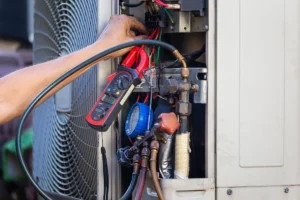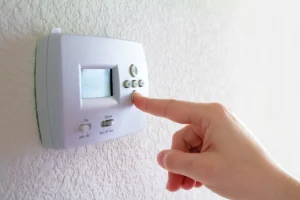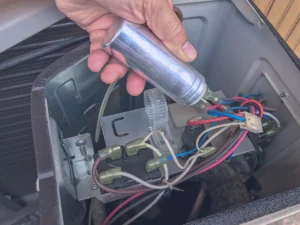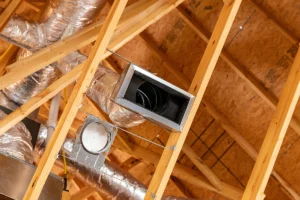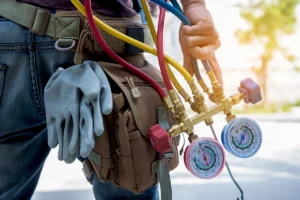As HVAC professionals at Sub Zero Temp Control in Vancouver, we regularly field questions about air handlers and their role in home comfort systems. Today, we’re breaking down what an air handler is and why it’s such a crucial part of your HVAC system. Let’s explore the technical aspects that make these units essential for your home’s comfort.
The Technical Reality: What is an Air Handler?
Think of your home’s HVAC system like a circulatory system, with the air handler acting as both the heart and lungs. While it might look like a simple metal box, the engineering inside is what makes these units fascinating and essential for home comfort.
Core Components: Breaking Down What an Air Handler Contains
- Blower Assembly (The Powerhouse):
- A precision-engineered motor and fan combination capable of moving thousands of cubic feet of air per minute
- Advanced ECM (Electronically Commutated Motor) technology allows for microscopic speed adjustments
- Smart pressure sensing capabilities maintain optimal airflow despite changing conditions
- Variable frequency drive technology enables superior temperature control
- Evaporator Coil (The Heat Exchange Center):
- Engineered with precise refrigerant control through copper tubing
- Enhanced surface area with 12-14 aluminum fins per inch for maximum heat transfer
- When discussing what an air handler’s most crucial component is, the evaporator coil tops the list
- Capable of removing up to 20 gallons of humidity per day during peak Vancouver summers
- Filter Rack and Air Filtration (The Purification System):
- Engineered to accommodate MERV ratings between 8-13 for optimal filtration without airflow restriction
- Advanced UV-C light treatment options available for enhanced air purification
- Multiple filter configuration options for different air quality needs
- Designed for easy access and maintenance
Real-World Operation: What an Air Handler Does
During peak operation, your air handler manages complex thermodynamic processes to maintain comfort:
Summer Operation:
- Heat Transfer Process:
- Refrigerant compression and heat release occurs in the outdoor unit
- Liquid refrigerant travels to the air handler’s evaporator coil
- Air circulation across the cold coil facilitates heat absorption
- Conditioned air distribution throughout the home
- Continuous monitoring of temperature and humidity levels
Winter Mode (Heat Pump Systems):
- The Reverse Flow:
- Heat energy extraction from outdoor air
- Indoor heat distribution via the air handler
- Auxiliary heat activation during extreme temperature conditions
- Maintain consistent airflow patterns for even heating
- Smart defrost cycling when necessary
Common Technical Issues and Detection Methods
Through extensive field experience, these are the primary concerns that require attention:
- Drainage System:
- Condensate pan integrity and levelness
- Primary and secondary drain line functionality
- Condensate pump operation (when applicable)
- Float switch response testing
- Electrical Components:
- Control board diagnostic monitoring
- Capacitor performance assessment
- Connection integrity verification
- Voltage and amperage testing across all circuits
- Airflow Management:
- Static pressure measurements
- Return air verification
- Supply duct integrity assessment
- System balance evaluation
Optimization Strategies
Critical factors for maintaining peak air handler performance:
- Preventive Maintenance Protocol:
- Systematic component inspection
- Coil cleaning and sanitization
- Motor and bearing assessment
- Electrical connection verification
- Control sequence testing
- Operational Guidelines:
- Return air pathway management
- Register and grille positioning
- Filter maintenance scheduling
- Outdoor unit clearance requirements
System Upgrade Considerations
Key factors in air handler replacement decisions:
- Performance Metrics:
- System efficiency ratings
- Operational cost analysis
- Repair frequency assessment
- Performance degradation evaluation
- Technology Advancements:
- Communicating system capabilities
- Variable-speed motor efficiency
- Smart diagnostic features
- Integration with modern controls
Selection Criteria
When evaluating what an air handler to select, consider these technical factors:
- System Sizing:
- Manual J load calculation requirements
- Building envelope characteristics
- Zones and ducting configuration
- Future capacity considerations
- Efficiency Analysis:
- SEER rating compatibility
- Motor efficiency ratings
- Static pressure capabilities
- Temperature maintenance ability
Advanced Features and Capabilities
Modern air handlers incorporate sophisticated technology that enhances their performance and reliability:
- Smart Integration Features:
- WiFi connectivity for remote monitoring and control
- Real-time performance data tracking
- Automatic fault detection and diagnosis
- Integration with smart home platforms
- Energy usage monitoring and reporting
- Advanced Air Quality Management:
- Multi-stage filtration capabilities
- Humidity control algorithms
- VOC (Volatile Organic Compound) detection
- Particulate matter monitoring
- Fresh air intake management
- Energy Optimization Systems:
- Dynamic fan speed modulation
- Adaptive learning algorithms
- Peak load management
- Energy recovery capabilities
- Thermal comfort optimization
Regional Considerations for Vancouver Homeowners
The Pacific Northwest climate presents unique challenges that affect what an air handler needs to handle:
- Humidity Management:
- Specialized dehumidification cycles
- Moisture removal optimization
- Condensate management systems
- Indoor air quality preservation
- Mold prevention strategies
- Seasonal Adaptation:
- Mixed-mode operation capabilities
- Shoulder season performance
- Heat pump defrost coordination
- Temperature swing management
- Outdoor air temperature compensation
- Energy Efficiency Focus:
- Heat recovery potential
- Free cooling capabilities
- Part-load performance optimization
- Demand-based ventilation
- System efficiency monitoring
Cost-Benefit Analysis
Understanding the financial aspects of air handler operation helps inform better decisions:
- Operating Cost Factors:
- Energy consumption patterns
- Maintenance requirements
- Filter replacement schedules
- Component life expectancy
- Performance optimization potential
- Long-term Value Considerations:
- Energy savings potential
- Comfort improvement benefits
- Air quality enhancement value
- Property value impact
- System longevity factors
Emergency Response and Troubleshooting
Knowing how to respond to common air handler issues can prevent minor problems from becoming major repairs:
- Emergency Indicators:
- Unusual noise patterns
- Vibration changes
- Temperature fluctuations
- Airflow variations
- System performance degradation
- Quick Response Protocol:
- Safety shutdown procedures
- Basic diagnostic steps
- Temporary workaround options
- Emergency service criteria
- Prevention strategies
Future Trends and Innovations
The HVAC industry continues to evolve, with new technologies shaping what an air handler can do:
- Emerging Technologies:
- IoT integration capabilities
- Predictive maintenance systems
- Advanced sensor networks
- Machine learning algorithms
- Energy harvesting potential
- Sustainability Features:
- Eco-friendly refrigerant compatibility
- Energy recovery systems
- Smart grid integration
- Carbon footprint reduction
- Renewable energy coordination
Technical Implementation
The installation and setup of an air handler requires precise attention to:
- Installation Parameters:
- Proper unit positioning
- Condensate management
- Ductwork connection integrity
- Electrical service requirements
- System Integration:
- Control system compatibility
- Outdoor unit matching
- Zoning system coordination
- Temperature sensor placement
After All
Understanding what an air handler is and its technical operation is fundamental for optimal HVAC system performance. At Sub Zero Temp Control in Vancouver, we leverage this technical expertise to ensure every air handler installation and service meets exact specifications for maximum efficiency and comfort.
Our technical team specializes in comprehensive air handler service, from routine maintenance to complete system design and installation. We focus on delivering precise solutions tailored to Vancouver’s unique climate conditions and your specific comfort requirements.
For expert consultation on what an air handler can do for your home comfort, contact Sub Zero Temp Control. Our technical expertise ensures your HVAC system operates at peak performance throughout every season.



